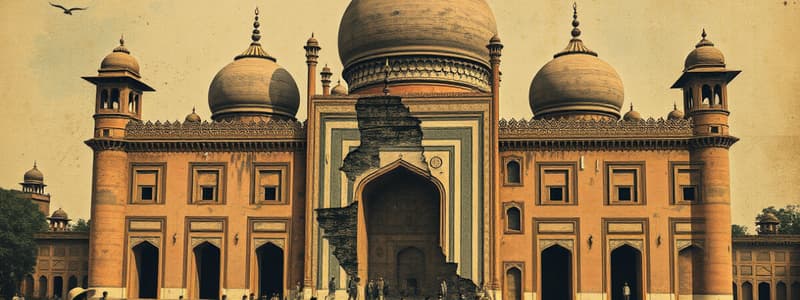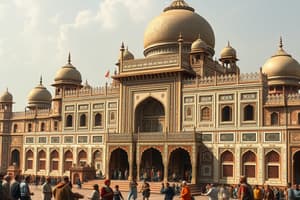Podcast
Questions and Answers
What was one significant consequence of Aurangzeb's policies during his reign?
What was one significant consequence of Aurangzeb's policies during his reign?
- Increased cooperation with regional powers
- Expansion of the Mansabdari system
- Creation of powerful enemies among regional groups (correct)
- Strengthened the Mughal treasury
What major issue plagued the successors of Aurangzeb?
What major issue plagued the successors of Aurangzeb?
- A clear law of succession to the throne
- Successful military campaigns
- Incompetence and a luxurious lifestyle (correct)
- Strong leadership and effective governance
Which event occurred after the death of Aurangzeb?
Which event occurred after the death of Aurangzeb?
- Immediate restoration of Mughal power
- A peaceful transition of power
- Unification of regional kingdoms
- A bloody war of succession among his sons (correct)
What was a primary reason for the Mughal Empire's military weakness?
What was a primary reason for the Mughal Empire's military weakness?
Which of the following regional groups became significant enemies of Aurangzeb's empire?
Which of the following regional groups became significant enemies of Aurangzeb's empire?
What system developed by Akbar was crucial to the military strength of the Mughal Empire?
What system developed by Akbar was crucial to the military strength of the Mughal Empire?
Which Mughal ruler came to power after Aurangzeb and was already of advanced age?
Which Mughal ruler came to power after Aurangzeb and was already of advanced age?
What characterized the leadership of Mughal rulers after Aurangzeb's death?
What characterized the leadership of Mughal rulers after Aurangzeb's death?
Who overthrew Chikka Krishna Raj to establish the kingdom of Mysore?
Who overthrew Chikka Krishna Raj to establish the kingdom of Mysore?
What was the significance of the First Anglo-Mysore War?
What was the significance of the First Anglo-Mysore War?
Which of the following statements is true about Shivaji?
Which of the following statements is true about Shivaji?
What role did Balaji Baji Rao play in the Maratha empire?
What role did Balaji Baji Rao play in the Maratha empire?
What was the outcome of the Third Battle of Panipat for the Marathas?
What was the outcome of the Third Battle of Panipat for the Marathas?
What was the concept of 'chauth' that the Marathas collected?
What was the concept of 'chauth' that the Marathas collected?
How did Shivaji manage to escape from prison in Agra?
How did Shivaji manage to escape from prison in Agra?
What major territorial achievement occurred during the peak of Maratha power?
What major territorial achievement occurred during the peak of Maratha power?
What characterized Hyder Ali's leadership in Mysore?
What characterized Hyder Ali's leadership in Mysore?
Which event marked the beginning of significant Maratha expansion?
Which event marked the beginning of significant Maratha expansion?
What weakened the Mughal Empire's military capabilities during foreign invasions?
What weakened the Mughal Empire's military capabilities during foreign invasions?
Which ruler invaded India in 1739, contributing to the Mughal Empire's decline?
Which ruler invaded India in 1739, contributing to the Mughal Empire's decline?
What was the primary function of the jagirdari system in the Mughal military?
What was the primary function of the jagirdari system in the Mughal military?
Which of the following statements is true regarding the nizams of Hyderabad?
Which of the following statements is true regarding the nizams of Hyderabad?
Which major battle resulted in British control over Bengal?
Which major battle resulted in British control over Bengal?
Who established a powerful Sikh Empire in the 18th century after fighting against Mughal rule?
Who established a powerful Sikh Empire in the 18th century after fighting against Mughal rule?
What role did Saadat Khan play in the history of Awadh?
What role did Saadat Khan play in the history of Awadh?
Which Mughal governor shifted the capital of Bengal from Dhaka to Murshidabad?
Which Mughal governor shifted the capital of Bengal from Dhaka to Murshidabad?
What title did a holder of a jagir possess in the Mughal military system?
What title did a holder of a jagir possess in the Mughal military system?
What characteristic was common among independent states that emerged from the crumbling Mughal Empire?
What characteristic was common among independent states that emerged from the crumbling Mughal Empire?
What architectural contribution did Maharaja Sawai Singh provide for Indian heritage?
What architectural contribution did Maharaja Sawai Singh provide for Indian heritage?
Which nawab established control over the Carnatic and declared independence from the Mughals in 1765?
Which nawab established control over the Carnatic and declared independence from the Mughals in 1765?
What was a significant consequence of Ahmad Shah Abdali's invasions?
What was a significant consequence of Ahmad Shah Abdali's invasions?
Flashcards are hidden until you start studying
Study Notes
Decline of the Mughal Empire
- The Mughal Empire disintegrated due to internal weaknesses and external pressures, particularly during Aurangzeb's reign.
- Aurangzeb's policies included religious intolerance and military expansion, leading to conflicts with regional powers like the Rajputs, Marathas, and Sikhs.
- Economic strain from continuous wars resulted in a demoralized military unable to defend against invasions.
Weak Successors and Court Dynamics
- Successors of Aurangzeb were largely ineffective, leading to factionalism and power struggles within the Mughal court.
- Significant rulers after Aurangzeb included Bahadur Shah, Jahandar Shah, Farrukhsiyar, Muhammad Shah, and Bahadur Shah II (Zafar).
- The lack of a clear succession law led to bloody conflicts for the throne.
Military and Administrative Structures
- The jagirdari and mansabdari systems, designed for military funding through land grants, deteriorated under later rulers, weakening military strength.
- The Mughal military lacked the naval and artillery strength required to repel foreign invasions effectively.
Foreign Invasions
- Nadir Shah's invasion in 1739 and subsequent attacks by Ahmad Shah Abdali severely weakened Mughal authority.
- Ahmad Shah Abdali's victories, including the Third Battle of Panipat in 1761, further dismantled Mughal control over India.
Emergence of Regional Kingdoms
- As Mughal authority waned, various provinces began to assert independence:
- Hyderabad: Established by Nizam-ul-Mulk, maintaining semi-independence while keeping the Marathas at bay.
- Awadh: Governed by Saadat Khan, became a center for culture under his successor Safdarjung.
- Bengal: Governed by Murshid Quli Khan, later fell to British control after the Battle of Plassey in 1757.
- Punjab: Dominated by Sikhs who established a powerful empire under Ranjit Singh after resisting Mughal power.
- Rajputs: Many kingdoms declared independence; Raja Sawai Jai Singh was notable for founding Jaipur.
- Rohilkhand: Established by the Rohillas, gained political influence but faced British and Awadh combined forces.
- Carnatic: Became semi-independent under Nawab Ali Khan Wallajah before British annexation.
- Mysore: Under Hyder Ali and later Tipu Sultan, who modernized the army and resisted British expansion.
The Marathas
- The Maratha Empire, founded by Shivaji in the 17th century, grew significantly amidst Mughal decline.
- Shivaji, inspired by the concept of Swaraj, expanded his territory, resisting Mughal control effectively.
- The ultimate decline of the Marathas occurred post-Third Battle of Panipat (1761), leading to diminished power against British encroachment.
Key Figures and Events
- Shivaji Maharaj: Established the Maratha kingdom and inspired a resistance against Mughal oppression.
- Balaji Vishwanath: Strengthened Maratha power as peshwa; tax collection rights legitimized their authority.
- Baji Rao I and Balaji Baji Rao: Expanded and secured Maratha dominance, leading to temporary control over Delhi.
Conclusion
- The 18th century in India was marked by the fragmentation of Mughal authority and the ascendancy of regional powers.
- The interplay of military conflicts and administrative failures laid the groundwork for the eventual British dominance in India, reshaping its political landscape.
Studying That Suits You
Use AI to generate personalized quizzes and flashcards to suit your learning preferences.




